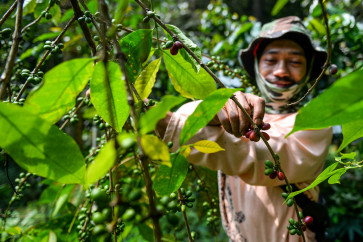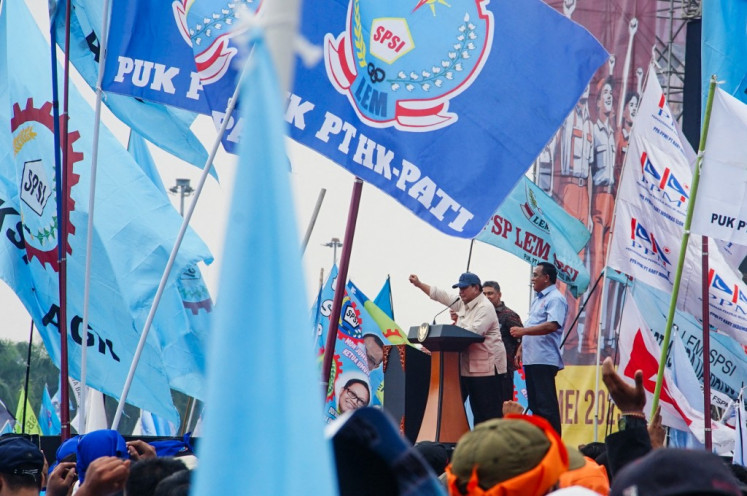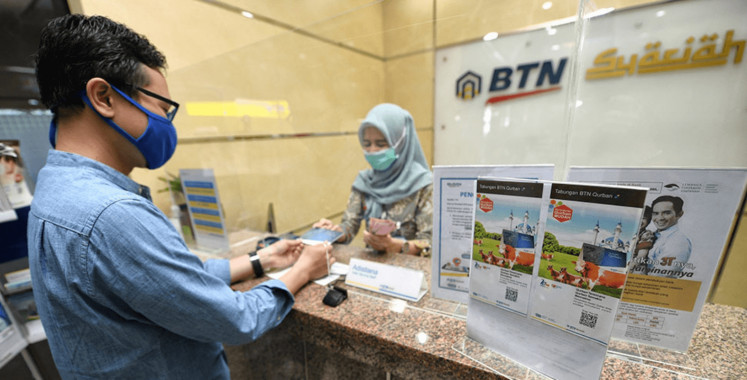Vale's earnings slump steeply amid sharp drop in nickel prices
Nickel miner Vale Indonesia reported a sharp drop in its net income by 42
Change text size
Gift Premium Articles
to Anyone

N
ickel miner Vale Indonesia reported a sharp drop in its net income by 42.7 percent year-on-year in 2013, driven down by a sharp fall in commodity prices last year.
The Jakarta-listed company's 2013 full-year financial statement issued Wednesday showed its after-tax profits dropped by 42.7 percent to US$38.65 million from $67.49 million in 2012, while its revenues slipped to $921.64 million last year from $967.33 million the previous year.
Vale Indonesia, which is part of giant Brazilian miner Vale, recorded a net loss of $7 million in the fourth quarter of last year, a free fall compared to the $10.8 million profit it booked the previous quarter, which president director Nicolaas 'Nico' Kanter previously said had been caused by 'a technical problem'.
Nico said earlier this month that the technical problem may lead to the company falling short of its 2013 production target.
Vale, according to the report, saw a 7 percent year-on-year rise in production to 75,802 metric tons of nickel matte last year. Vale's nickel matte deliveries rose last year by 8 percent to 77,198 metric tons from 70,717 metric tons in 2012.
A sharp drop in commodity prices, however, is likely to have dragged down profits
The drop in the price of nickel in global markets was triggered by the European financial crisis. Furthermore, China, as one of the largest markets for nickel, is currently experiencing an oversupply, causing less demand.
Meanwhile, an increase in production, particularly in Indonesia ahead of the implementation of the ore export ban, which came into effect in early January, caused an oversupply in the market, making the price fall even further.
Vale's average selling price (ASP) slumped by nearly 12 percent, from $13,552 in 2012 to $11,939 last year. The company sold at lower prices throughout the year, with its ASP in the fourth quarter standing at $10,797, down slightly from $10,981 the previous quarter.
Nevertheless, the company's revenue costs also fell to $781.74 million in 2013, down from $800.62 million the previous year.
Revenue costs per metric ton of nickel in matte production declined by 7 percent to $10,313 per ton
from $11,091 per ton in 2012, mainly driven by lower fuel and lubricant costs, employee costs, services and contracts costs and other costs, as well as the benefits of fixed-cost dilution due to higher production
volumes.
'That lower per-ton cost in 2013 compensated for a 12 percent average realized price decline from 2012 to 2013. An increase in Vale's deliveries of 8 percent as a result of higher production levels helped offset some of the impact from the lower realized price in 2013.' Febrianny Eddy, Vale Indonesia's chief financial officer, said in a statement made available to the press on Wednesday.
As previously reported, Vale expects to produce 79,691 metric tons this year ' remaining flat compared to last year.
The firm also expects the price of nickel to rebound and touch $16,000 per ton this year on the back of supply disruptions from Indonesia, which implemented the ban on the export of unprocessed ore on Jan. 12.
With the expected price increase, Vale expects to earn $1 billion in total sales this year, according to a document given to members of the House of Representatives during a session on Wednesday. The company expects to book roughly $112 million on its bottom line.
Analysts have said the implementation of the ore-export ban will be positive for Vale Indonesia, as the company already produces the end metal, nickel matte.
Under the 2009 Mining Law, all mining companies are required to process ore in domestic smelters
before export.
'JP/Anggi M. Lubis









